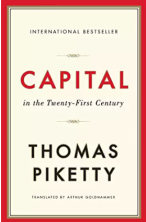4 stars out of 5
Pinker’s big push for the Enlightenment values that got us where we are is the right message at the right time. Not perfect, mind you. Pinker’s cheerleading for capitalism goes a little overboard and understates the problems commensurate with it. His treatment of cultural movements that press against the Enlightenment, such as Romanticism, are at times astonishingly simplistic. Enough so to undermine his credibility in isolated passages. When he criticizes Thomas Piketty’s landmark Capital in the 21st Century, Pinker has a point in that Piketty’s emphasis on wealth inequality elides the improvements in material life that have carried all classes forward. But Piketty’s willingness to look at the good, the bad, and the ugly of late capitalism makes his work seem more impartial overall, less slanted than Pinker’s. The charts and counter-charts that make Piketty’s book more tedious and less readable than Pinker’s more informal tome also make Piketty’s analysis seem more balanced and complete.
Overall, though, Pinker’s own core thesis is persuasive and exceedingly timely. After all, the Right has always had a deeper investment in religious and authoritarian structures that cut against the Enlightenment’s commitment to open inquiry and to a principle of individual freedom that transcends religion, region, or demographic. It is only recently that the postmodern Left has joined in the attack, often renouncing the Enlightenment standards of universal truth (accessible to reason and science) and condemning the Enlightenment-based liberal Western democracies as hopelessly enmired in racism, sexism, and other oppressive formations. In this regard, Pinker’s pushback against the Left as well as the Right is spot on. Despite the obvious bumps along the way, and bumps that are still with us, the Enlightenment, with its philosophical message of universal rights over tribalism and of the universal standards of reason and science, has resulted in the most humane, anti-sexist, and racially tolerant sensibility in social history. This is measurable in Pinker’s statistical graphs (and most visibly of late in the Washington Post’s worldwide survey-based map). That there were bumps and contradictions along the way, that challenges of social justice are still with us, is no reason to attack the foundation of the Enlightenment and of the Western liberal democracies that go along with it. Indeed, it would be preposterous to expect no bumps, no contradictions and challenges. We need to improve, perhaps even to do so at a revolutionary pace, but we need to start by working with what we have, not throwing it all overboard and creating a vacuum for some less Enlightenment-based power formation to move in.






“Forgetfulness, n. A gift of God bestowed upon debtors in compensation for their destitution of conscience.”
– Ambrose Bierce
LikeLiked by 1 person
If I get your drift, Brahmachari, you’re even tougher on our forgetful young radical friends than I am!
LikeLike
In the pocket as always, Doc.
LikeLiked by 1 person
Thanks Shakyhead,
Interesting and well written. We’ve been in India and SEA for some months and the triumph of consumer capitalism is everywhere. The standards of living, life expectancy and general health, wealth and well being of almost a billion people are undeniably hugely improved since I was last here in the 1980s. India seems to also be refuting Malthus in that it’s booming prosperity and population growth have coincided.
LikeLiked by 2 people
Thanks, my dislocated friends. You have actually pinpointed (better than I had myself) one of the points of disagreement between Pinker and me. I’m with him on acknowledging quality-of-life improvements — and especially those related to sociopolitical values like freedom, tolerance, universal rights and standards of inquiry, etc. — and I am happy to see Malthus thwarted by our friends in India, but we differ on the merits of consumer capitalism. That’s one of the areas where I think we need to throw away the husk and find the hidden fruit that will take us to the next stage. I.e., we need to preserve the Enlightenment-based sociopolitical values that we see in Western liberal democracies but move beyond the mindset that defines human fulfillment in terms of purchasing power. https://shakemyheadhollow.wordpress.com/2012/12/29/regifting-and-post-tech-ethics/
(To be fair to Pinker, this is a bit out of his scope, which was to reassert the continuing value of Enlightenment ideas, and it might be this scope, rather than negligence, that led him to downplay the need to rethink the state of capitalism going forward.)
LikeLike
I read Capital some time ago. So I will get this one and give it a go. Thanks for this interesting critique and comparison.
LikeLiked by 1 person
Thanks, Anne. I hope you find my comparison/contrast a useful starting point. If not, feel free to come back to the comment section and add your alternative reading 🙂
LikeLiked by 1 person